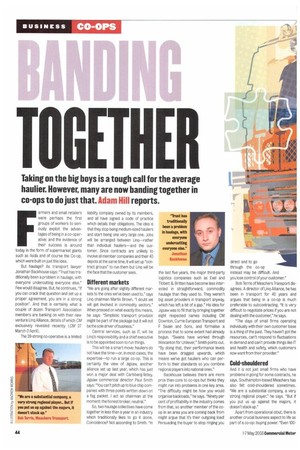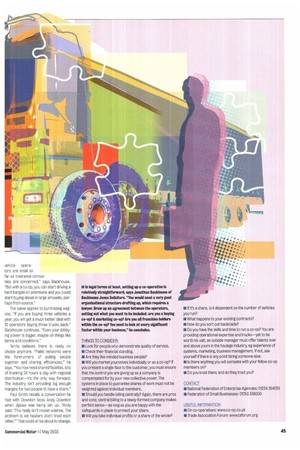TOGETHER
Page 44

Page 45

If you've noticed an error in this article please click here to report it so we can fix it.
Taking on the big boys is a tough call for the average haulier. However, many are now banding together in co-ops to do just that. Adam HID reports.
Farmers and small retailers were perhaps the first groups of workers to seriously exploit the advantages of being in a co-operative; and the evidence of their success is around today in the form of supermarket giants such as Asda and of course the Co-op, which were built on just this idea.
But haulage? As transport lawyer Jonathan Backhouse says; "Trust has traditionally been a problem in haulage, with everyone undercutting everyone else." Few would disagree. But, he continues, "if you can crack that question and set up a proper agreement, you are in a strong position". And that is certainly what a couple of dozen Transport Association members are banking on with their new venture Linq Alliance, details of which CM exclusively revealed recently (CM 27 March-2 April).
The 28-strong co-operative is a limited
liability company owned by Its members, and all have signed a code of practice which details their obligations. The idea is that they stop being medium-sized hauliers and start being one very large one. Jobs will be arranged between Ling—rather than individual hauliers—and the customer. Since contracts are unlikely to involve all member companies and their 40 depots at the same time, it will set up "contract groups'. to run them but Linq will be the face that the customer sees.
Different markets
"We are going after slightly different markets to the ones we've been used to," says Linq chairman Martin Brown. "I doubt we will get involved in commodity sectors." When pressed on what exactly this means, he says: "Simplistic transport provision might be part of the package but it will not be the sole driver of business."
Central services, such as IT. will be Linq's responsibility and a chief executive is to be appointed soon to run things.
This will be a smart move: hauliers do not have the time—or, in most cases, the expertise—to run a large co-op. This is certainly the view of Jigsaw, another alliance set up last year, which has just won a major deal with Carlsberg-Tetley. Jigsaw commercial director Paul Smith says: "You can't pitch up to blue chip companies with three points written down on a fag packet. I act as chairman at the moment: the honest broker, neutral."
So, two haulage collectives have come together in less than a year in an industry which traditionally likes to go it alone. Coincidence? Not according to Smith. "In the last five years, the major third-party logistics companies such as Exel and Tibbett tr. Britten have become less interested in straightforward, commodity haulage than they used to. They weren't big asset providers in transport anyway, which has left a bit of a gap." His idea for Jigsaw was to fill that by bringing together eight respected names including CM Downton, Currie European Transport and F Swain and Sons, and formalise a process that to some extent had already begun. "Swains have worked through Wincanton for Unilever" Smith points out. "By doing that, their performance levels have been dragged upwards, which means we've got hauliers who can perform to their standards so you combine regional players into national ones."
Backhouse believes there are more pros than cons to co-ops but thinks they might run into problems in one key area. "The difficulty might be how you would organise backioads," he says. "Ninety per cent of profitability in the industry comes from that, so another member of the coop in an area you are coming back from might argue that it's their outgoing load! Persuading the buyer to stop ringing you direct and to go through the co-op instead may be difficult. And you lose control of your customer."
Bob Terris of Meachers Transport disagrees. A director of Linq Alliance, he has been in transport for 40 years and argues that being in a co-op is much preferable to subcontracting. "It is very difficult to negotiate prices if you are not dealing with the customer" he says.
"The days of small firms operating individually with their own customer base is a thing of the past. They haven't got the resources, can't respond to fluctuations in demand and can't provide things like IT and health and safety, which customers now want from their provider."
Cold-shouldered
And it is not just small firms who have problems in going for some contracts, he says. Southampton-based Meachers has also felt cold-shouldered sometimes. "We are a substantial company, a very strong regional player," he says. "But if you put us up against the majors, it doesn't stack up."
Apart from operational clout, there is another crucial business aspect to life as part of a co-op: buying power. "Even 100 vehicle opera tors are small as far as insurance companies are concerned," says Backhouse. But with a co-op, you can start driving a hard bargain on premiums and you could start buying diesel in large amounts, perhaps from source."
The same applies to purchasing wagons. if you are buying three vehicles a year, you will get a much better deal with 10 operators buying three trucks each," Backhouse continues. "Even your lobbying power is bigger, maybe on things like terms and conditions."
Terris believes there is really no choice anymore. "Pallet networks were the forerunners of pulling people together and sharing efficiencies," he says. "You now need shared facilities, lots of trunking 24 hours a day with regional distribution—it's the only way forward. The industry isn't providing big enough margins for two people to have a share."
Paul Smith recalls a conversation he had with Downton boss Andy Downton when Jigsaw was being set up. 'Andy said: 'This really isn't rocket science. The problem is we hauliers don't trust each other.That could all be about to change.
































































































































































